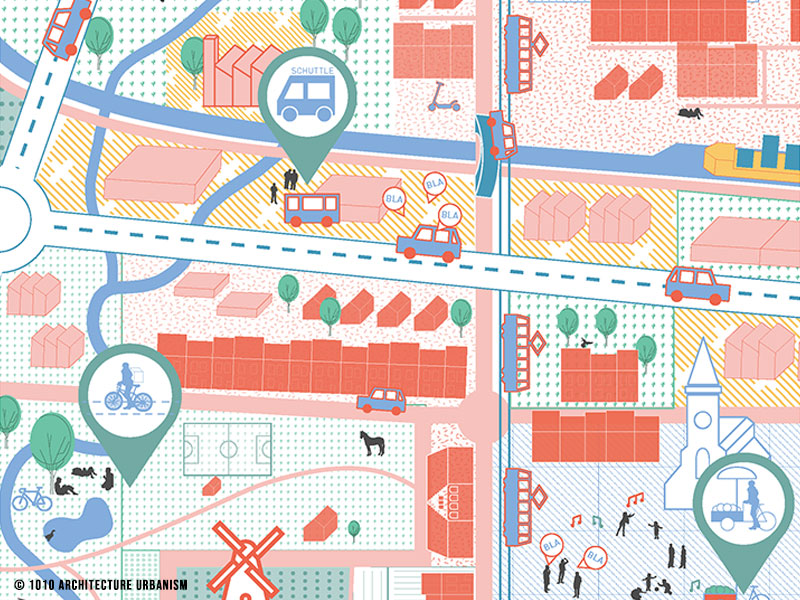Demonstration project Merelbeke
19019
From 2019 to 2023
In Merelbeke, a demonstration project was set up to integrate shared mobility systems into spatial development. TML carried out a mobility analysis and, together with project partners, developed a vision combining mobility and urbanisation, focusing on microcentricity and the use of soft transport modes.
Merelbeke is located on the outskirts of Ghent and has been experiencing strong population growth and mobility problems for several years. In the current social context, it is desirable that the spatial development of cities and towns is no longer driven by car traffic alone. By taking an alternative shared mobility system as a guiding factor for their spatial development, we can transform urbanisation into a more future-oriented and sustainable alternative. The demonstration project in Merelbeke was an example of how this objective can be achieved, considering the site-specific context of existing or new crucial places.
Within this project, Merelbeke served as a demonstration municipality for alternative spatial structures and mobility systems (including shared mobility). The concept of microcentrality was central to this: facilities are spread over several smaller cores that focus on shorter trips with soft modes.
Within this project, TML carried out a mobility analysis in a first phase. The analysis was done on the one hand quantitatively, using existing figures and data, an origin-destination survey on the territory of Merelbeke (conducted in 2019), spatial developments, and so on, and on the other hand in a qualitative way, using a perception survey of different actors.
Based on this analysis, together with the other project partners, we developed a vision integrating two tracks, namely mobility and urbanisation. Alongside this vision, we also defined preconditions and measures.
Finally, some cases were highlighted where the mobility and urbanisation issues converged. The aim was mainly to translate the vision into design research at micro and meso scale.
Merelbeke is located on the outskirts of Ghent and has been experiencing strong population growth and mobility problems for several years. In the current social context, it is desirable that the spatial development of cities and towns is no longer driven by car traffic alone. By taking an alternative shared mobility system as a guiding factor for their spatial development, we can transform urbanisation into a more future-oriented and sustainable alternative. The demonstration project in Merelbeke was an example of how this objective can be achieved, considering the site-specific context of existing or new crucial places.
Within this project, Merelbeke served as a demonstration municipality for alternative spatial structures and mobility systems (including shared mobility). The concept of microcentrality was central to this: facilities are spread over several smaller cores that focus on shorter trips with soft modes.
Within this project, TML carried out a mobility analysis in a first phase. The analysis was done on the one hand quantitatively, using existing figures and data, an origin-destination survey on the territory of Merelbeke (conducted in 2019), spatial developments, and so on, and on the other hand in a qualitative way, using a perception survey of different actors.
Based on this analysis, together with the other project partners, we developed a vision integrating two tracks, namely mobility and urbanisation. Alongside this vision, we also defined preconditions and measures.
Finally, some cases were highlighted where the mobility and urbanisation issues converged. The aim was mainly to translate the vision into design research at micro and meso scale.


